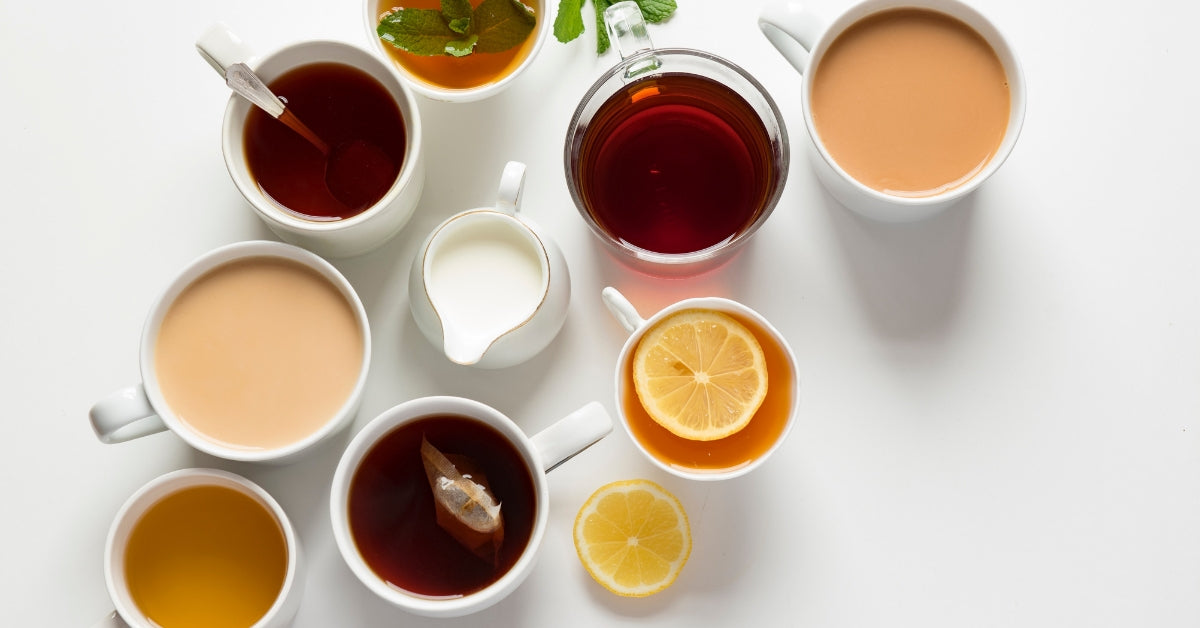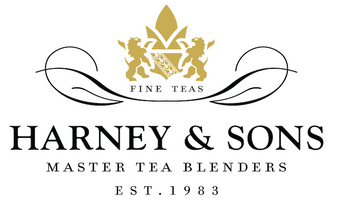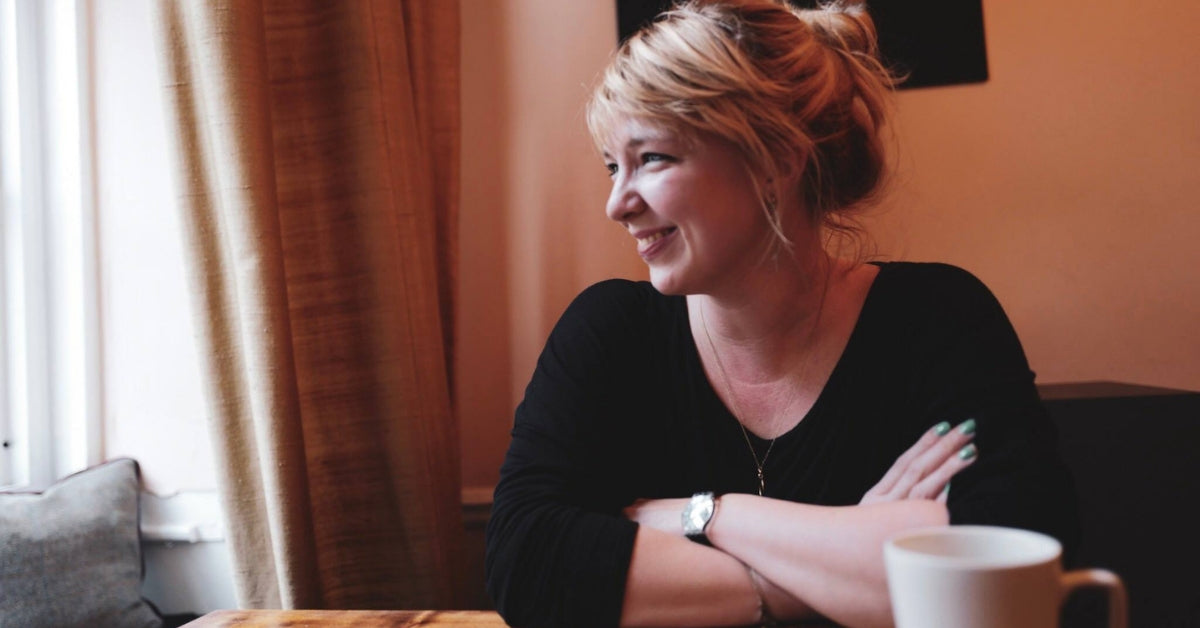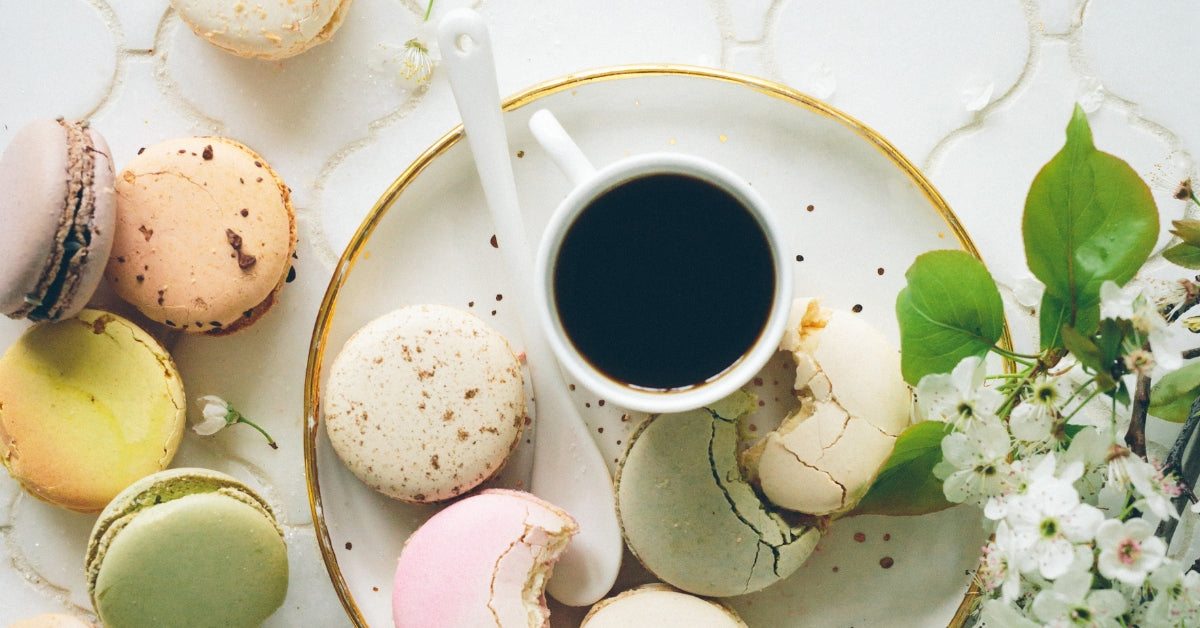We all have different reasons we drink tea. While some drink it to wind down, others drink it to perk up. Some may simply enjoy the warm, comforting qualities of this ancient beverage while others love to cool down with it on a summer afternoon. No matter what your reason is, understanding the amount of caffeine contained in your delicate teacup or monster mug will only enhance your experience and your relationship with tea. Read on to learn about the amount of caffeine in tea, what affects caffeine levels in tea and common caffeine myths.

Caffeine Amounts in Tea
No matter what you drink, there is no one-size-fits-all number for the amount of caffeine in your favorite type of tea. Caffeine levels in tea can be affected by how they are processed and brewed, but we’ll get into that later. Until then, you can rest easy knowing that our teas typically have between 40 and 60 milligrams of caffeine per cup with matcha teas and white teas taking first and second place in the “Most Caffeinated Tea” category. So, if you are looking for a tea to replace your morning joe, we suggest checking out our selection of matcha and white teas. If you are looking for a caffeine-free brew you’ll love our herbal teas.
What Affects Caffeine Levels in Tea?
The amount of caffeine present in tea can be affected by the way the tea is processed or brewed. For example, brewing teas in higher water temperature, for a longer period of time, or at a higher ratio of tea leaves to water will increase the amount of caffeine present in your tea. When in doubt, look at the tea grade. The tea grade can tell you a lot about the level of caffeine in your cup. Teas are placed in different tea grades or categories based on how broken or whole their leaves are. The more broken a leaf, the faster the caffeine will be released in water. Oftentimes, the tea leaves in teabags are very broken so they typically have higher levels of caffeine than their full leaf counterparts, when infused the same way.
The most well-known tea that contains extremely broken leaves is matcha tea. Matcha tea leaves are actually so broken that the tea is sold as a fine powder which means you consume the entire leaf and reap all of the benefits. Powdered teas like matcha are typically very high in caffeine. Twisted or rolled teas, like oolong teas, typically release caffeine more slowly than other leaves that may be flat or open. Very “tippy” teas, or teas that have a high-tips-to-leaves ratio, usually have higher levels of caffeine than teas that do not contain many tips. If your tea contains mostly stems or “twigs” like our African Antlers or Hojicha teas, they probably do not contain much caffeine at all. If you enjoy drinking tea blends, be advised that these often contain less caffeine than non-blends because the tea leaves that are usually present in a non-blended tea have been replaced with fruits, herbs and spices.

Common Caffeine Myths (Busted!)
There’s so much more to learn about the world of tea. Read some of our favorite posts below to further your tea expertise:





9 comments
Linda
“…tea has the added amino acid L-Theanine, which crosses the blood-brain barrier and stimulates the production of dopamine and serotonin…”
Now THAT is cool! I never knew. Answers something I’d been wondering about though. After being a die-hard coffee drinker for over three decades, I had to kick my former love to the curb and took up drinking tea instead. I’ve noticed I feel much better overall since I’ve done that, and it seemed like more than could be accounted for by better sleep from lower caffeine intake. And here’s my answer. So cool.
“…tea has the added amino acid L-Theanine, which crosses the blood-brain barrier and stimulates the production of dopamine and serotonin…”
Now THAT is cool! I never knew. Answers something I’d been wondering about though. After being a die-hard coffee drinker for over three decades, I had to kick my former love to the curb and took up drinking tea instead. I’ve noticed I feel much better overall since I’ve done that, and it seemed like more than could be accounted for by better sleep from lower caffeine intake. And here’s my answer. So cool.
Donna Sterlace
I always learn something from your tea articles! I had no idea that white tea and Matcha have more caffeine than black tea.I have been a tea drinker since I was in my early 20’s (I’m 66 now!) and I especially love your Earl Grey Supreme tea! Drinking tea for me is calming, gives me a great start to my day and the warm mug in my hand is very soothing! Thank you for your educational tea articles.
I always learn something from your tea articles! I had no idea that white tea and Matcha have more caffeine than black tea.I have been a tea drinker since I was in my early 20’s (I’m 66 now!) and I especially love your Earl Grey Supreme tea! Drinking tea for me is calming, gives me a great start to my day and the warm mug in my hand is very soothing! Thank you for your educational tea articles.
Matthew Keller
You didn’t specifically mention it, but inferring from your post, would green teas (typical green tea, not matcha) have less caffeine because they’re generally brewed at lower temperatures and shorter periods of time? If brewed the same, would they have similar caffeine levels to black tea?
Thanks for the information!
You didn’t specifically mention it, but inferring from your post, would green teas (typical green tea, not matcha) have less caffeine because they’re generally brewed at lower temperatures and shorter periods of time? If brewed the same, would they have similar caffeine levels to black tea?
Thanks for the information!
Paula Moreshead
Thanks for the informative article…I had wondered about the size of the leaves and how much that affects caffeine levels since it seems to make a stronger tea with a shorter infusion time.
~Paula
Thanks for the informative article…I had wondered about the size of the leaves and how much that affects caffeine levels since it seems to make a stronger tea with a shorter infusion time.
~Paula
Beth Hunt
Thanks for the great read! I had no idea that white tea had a high caffeine level! I drink a cup in the morning and also in the afternoon so it’s good to be aware of how much is in each tea so I can still get to sleep at night. I have been a tea drinker since childhood when my mother would sometimes brew me a cup after lunch. Now both of my boys (aged 14 and 11) enjoy a cup with me each morning before breakfast. They even ask for your Earl Grey Supreme and Malachi McCormick by name! Can you say “spoiled”?! Haha. Anyhow, thank you for making teatime an even nicer time of day!
Thanks for the great read! I had no idea that white tea had a high caffeine level! I drink a cup in the morning and also in the afternoon so it’s good to be aware of how much is in each tea so I can still get to sleep at night. I have been a tea drinker since childhood when my mother would sometimes brew me a cup after lunch. Now both of my boys (aged 14 and 11) enjoy a cup with me each morning before breakfast. They even ask for your Earl Grey Supreme and Malachi McCormick by name! Can you say “spoiled”?! Haha. Anyhow, thank you for making teatime an even nicer time of day!
Olivia Byam
Thanks for the very detailed explanation of the differences between decaf and regular tea. I love your teas and was very impressed when at breakfast yesterday morning at the Ashby Inn in Paris, VA the tea choices were all Harney teas.
Thanks for the very detailed explanation of the differences between decaf and regular tea. I love your teas and was very impressed when at breakfast yesterday morning at the Ashby Inn in Paris, VA the tea choices were all Harney teas.
Jane Ehrenfeld
Caffeine amounts in coffee varies much as it does in tea but a typical 8 oz cup will have 95 mg of caffeine and an 8 oz cup of decaf will have 3 mg. I made the switch to tea in the morning years ago when I realized that my morning cup of coffee was not sitting well on an otherwise empty stomach. I never had a problem with the lower amount of caffeine. Now I drink decaf black teas so I found the fact that rolled teas such as oblongs release caffeine more slowly to be of interest. I have heard that green tea is also quite high in caffeine contrary to popular belief. Does anyone know if that’s true?
Caffeine amounts in coffee varies much as it does in tea but a typical 8 oz cup will have 95 mg of caffeine and an 8 oz cup of decaf will have 3 mg. I made the switch to tea in the morning years ago when I realized that my morning cup of coffee was not sitting well on an otherwise empty stomach. I never had a problem with the lower amount of caffeine. Now I drink decaf black teas so I found the fact that rolled teas such as oblongs release caffeine more slowly to be of interest. I have heard that green tea is also quite high in caffeine contrary to popular belief. Does anyone know if that’s true?
Douglas E Zabel
Tea has more caffeine than coffee.
It is my understanding that there is more caffeine per pound of most Camellia sinensis tea leaves than there is in a pound of most coffee beans; however, since one can usually get many more cups of tea from a pound of tea leaves than one can get from a pound of coffee beans, the amount of caffeine on a per cup basis is much less for tea leaves, typically one half to one third as much.
Tea has more caffeine than coffee.
It is my understanding that there is more caffeine per pound of most Camellia sinensis tea leaves than there is in a pound of most coffee beans; however, since one can usually get many more cups of tea from a pound of tea leaves than one can get from a pound of coffee beans, the amount of caffeine on a per cup basis is much less for tea leaves, typically one half to one third as much.
Anne Rogers
Good read! Thank you
Good read! Thank you